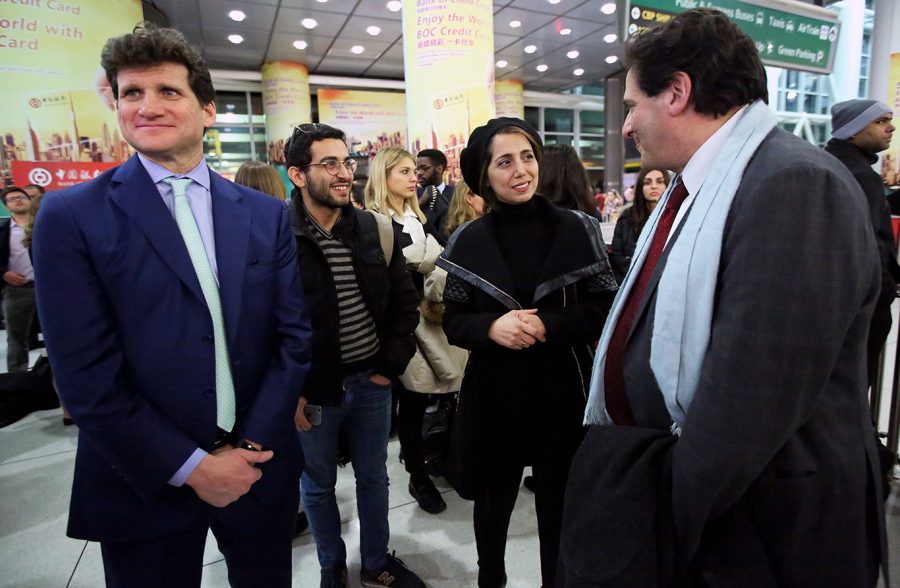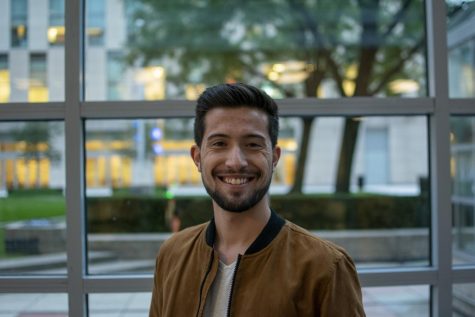Fordham Alum Accused in Nationwide Admissions Scandal
Award-winning lawyer faces charges of mail fraud and honest services mail fraud in nationwide conspiracy.
BRUCE GILBERT/FORDHAM NEWS
Gordon Caplan (left), and Dean Matthew Diller (right), wait at JFK international airport with Fahimeh (Farimah) Kashkooli (Center) and Fordham Law students for the arrival of Alma Kashkooli.
March 27, 2019
Update: (April 10, 2019) Mr. Caplan has released his intent to plead guilty to these charges. Read the new story here.
Update: (March 28, 2019) New details surrounding Mr. Caplan’s involvement in the Fordham Community were added to the story.
On Tuesday, March 12, federal prosecutors charged 50 people, including one graduate of Fordham Law, in a nationwide college admissions conspiracy that enabled wealthy parents to buy their children’s way into elite universities by way of bribery, fraud and fake admissions profiles.
The case centers around middleman William Singer, founder of the college preparatory business Edge College & Career Network, who has pleaded guilty to charges of mail fraud, bribery and more in a college application scheme based on fixing grades and test scores as well as doctoring application profiles.
Singer used the nonprofit arm of his business, the Key Worldwide Foundation, to accept payments and assist admissions officers, coaches, test proctors, parents and students in fraudulent activities.
Gordon Caplan, Fordham University School of Law ’91, was one parent who allegedly used Singer’s illegal services. Caplan, a resident of both Greenwich, Connecticut and Manhattan, is a lawyer and a co-chairman with Willkie Farr & Gallagher, an internationally renowned law firm. Caplan was awarded the prestigious Louis J. Lefkowitz Public Service Award by Fordham Law in 2016 and the Dealmaker of the Year Award by American Lawyer in 2018.
Caplan’s charges come from information gathered via wiretap by the FBI during their months-long investigation, dubbed “Operation Varsity Blues.”
According to prosecutors, Caplan secured testing accommodations for a disability his daughter did not have and paid Singer $75,000 in a scheme to doctor her test scores. Singer instructed Caplan to fly his daughter to a testing location in Los Angeles, where Singer reportedly bribed test proctors and staff with funds from his company’s nonprofit arm.
The FBI also released wiretap transcripts from a series of calls between Singer and his alleged conspirators, including Caplan, on March 12.
“There’s lots of ways to do this. I can do anything and everything, if you guys are amenable to doing it,” Singer told Caplan over the phone.
Caplan expressed concern in the call about his daughter’s scores for getting into Cornell, his alma mater for his undergraduate degree. The payment of $75,000 to Singer was meant to secure a score “strong enough” for the school.
Singer used his business and contacts to allow Caplan’s daughter an individual testing room where a bribed proctor could alter the results of the test, unbeknownst to her.
“That’s how simple it is,” Singer said to Caplan. “She doesn’t know. Nobody knows what happens. It happened, she feels great about herself. She got a test a score, and now you’re actually capable for help getting into a school. Because the test score’s no longer an issue. Does that make sense?”
In another call with Singer meant to clarify the plan, Caplan expressed some discomfort.
“I mean this is, to be honest, it feels a little weird,” Caplan said.
Singer, who has claimed to have handled millions of dollars through his business, was able to convince Caplan of the plan’s security.
“I know it does,” Singer said. “I know it does. But when she gets the score and we have choices, you’re gonna be saying, ‘okay, I’ll take all my kids, we’re gonna do the same thing.’”
“Yeah, I will,” said Caplan. After a brief pause, “So, how do I get this done with you? What do I need to do?”
During Fordham Law’s 25th Annual Public Interest Student, Alumni and Faculty Awards Dinner in 2016, Caplan was one of three Fordham alumni to receive the Louis J. Lefkowitz Public Service Award. This award is given to Fordham Law alumni who exemplify Fordham’s values in advancing public service and civic law. The award is distributed by the Dean of Fordham Law, Matthew Diller.
Caplan has held a long-standing position within Fordham Law’s community as a well-respected litigator for public service. After winning the Lefkowitz award in 2016, he engaged in a dramatic pro bono bid for a young Iranian girl’s medical treatment in the United States amidst President Trump’s travel ban.
Alma Kashkooli, the 12-year old daughter of Fahimeh (Farimah) Kashkooli, Fordham Law ’17, was scheduled for an urgent surgery in the United States, but was prevented from entering the country. In a highly publicized series of events, members of the Fordham Law community, including Caplan and Dean Diller, came together to assist the Kashkooli family. Caplan’s firm, Willkie Farr & Gallagher, represented the family pro bono.
Since the release of the FBI’s report, all mentions of Caplan have been removed from Willkie Farr & Gallagher’s website. If he is convicted on his felony charges, he will be automatically disbarred by the New York State Bar Association.
The office of Dean Diller, as well as Fordham Law’s Office of Communications and Media Relations, had no comment to share about Caplan at this time.
“To be honest, I’m not worried about the moral issue here. I’m worried about the, if she’s caught doing that, you know, she’s finished,” Caplan told Singer in the final transcript released by the FBI. He is set to appear in federal court on April 3.














bud palmer • Apr 2, 2019 at 9:03 am
To Law School Dean Diller,
Teach your children well so the song goes. Namely, teach your students ethics/ morals not only in a legal educational setting but also as a foundation on how one conducts his/her own personal life as one day it might determine if they will be disbarred from the legal industry. Your ’91 grad should be treated in a court of law no different than a ’91 Tier3 bottom of the class graduate. Not to worry, Caplan’s deceased FIL was a very wealthy man who donated 2.5 Million for a building at the UCONN in the 1980’s. So if Cornell is not a possibility for his daughter, maybe she might be accepted to this state university, and as a bonus, at in sate tuition rates. A fitting outcome for someone trying to cheat his daughter into his and his deceased FIL Ivy league undergrad institution. Hopefully that Cornell undergrad spot will go to some well deserving high school student and maybe in the future that person might be accepted into Fordham Law.
Barbara • Dec 21, 2023 at 6:54 am
Trump’s travel ban seems quaint at this point. I wonder how Jewish folks feel now that the FBI admitted terrorists have slipped in?